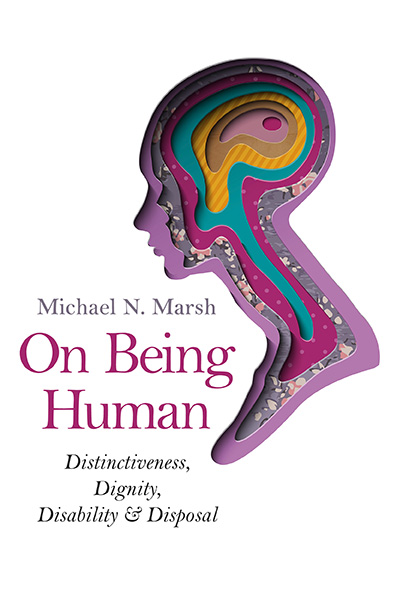On Being Human
A study of human beings – our origins, status, beginnings and endings. It asks what is entailed in being human?

A study of human beings – our origins, status, beginnings and endings. It asks what is entailed in being human?
A study of human beings – our origins, status, beginnings and endings. It asks what is entailed in being human?
Christianity (general), Life sciences (general), New thought
A study of human beings – our origins, status, beginnings and endings. It asks what is entailed in being human?
Click on the circles below to see more reviews
. Michael Marsh has an interesting background as University lecturer in medicine and consulting gastroenterologist specialising in immunopathology. He returned to Oxford to do a degree in theology and wrote his D Phil thesis on near death and out of body experiences, published in 2010. Unfortunately, I did not see this book at the time. This new book reflects his interest in ethical outcomes of medical practice and biomedical research. It deals with the four D’s of distinctiveness, dignity, disability and disposal, and encompasses a vast range of theoretical and practical issues. The first part draws on evolutionary anthropology, genetics and epigenetics, consciousness studies and the acquisition of language to build up a picture of human distinctiveness. Under dignity, he discusses theological approaches to personhood and the question of whether moral status can be ascribed to the human embryo/foetus. In this regard, he goes back to the Warnock report of the mid-1980s and argues for the bold position of ascribing moral status from the moment of conception as a human being with a unique genome. Being disabled, dysfunctional or disfigured should have no bearing on basic human dignity. Under disposal, he considers abortion and infanticide at one end of life, and assisted death and suicide at the other. He comes up with his own well argued case while sounding appropriate cautionary notes. Both the introduction and final resumé give very clear account of his argument and enhance the reader’s understanding about the depth of being human. As an aside, I find it interesting that he gave an example of ‘presence in absence’ by speaking about a visit from his grown children where the conversation revolves around the practical what rather than the deeper who, and one is left wondering how well one still knows them. Anyone deeply concerned with these ethical issues will be greatly enriched by reading this careful book. ~ David Lorimer, Paradigm Explorer
On Being Human constitutes an achievement in anthropological analysis, conceived as a broad interdisciplinary endeavour, and encompassing a huge range of theoretical and practical issues. Marsh offers a multi-level exposition on the scope of human nature, added to by scientifically and bio-medically based approaches, thus permitting an accurate assessment of personhood and its defining characteristics. This is the necessary basis for a serious and engaged treatment of very sensitive issues concerning human life, its beginnings, its end, and dignity (particularly for the fetus, the disabled, and infirm). Marsh brings the ethical discussion to a new high with its impressive and wide erudition, employing well-reasoned arguments from recent research, to assist in the best understanding of the meaning of human life – and how to live it. ~ Fr. Lluis Oviedo OFM, Professor of Christian Anthropology, Pontifical University Antonianum, Rome, Italy
After a long and distinguished medical career, where one's identity and sense of self develops primarily through what one does, Michael Marsh takes the reader on a scientifically informed, spiritual journey of Christian faith in search of what it means to simply be. An inspiring and sometimes challenging, personal interpretation of the sanctity and meaning of being human. Highly recommended. ~ Jay R. Feierman MD, Professor of Psychiatry (Emeritus), University of New Mexico, USA
Having spent a lifetime in clinical practice and biomedical research, Michael Marsh argues that routine discussions of what it is to be human too rarely consider the large proportion of humankind who are disfigured or disabled, dysfunctional or approaching death. In a deeply empathetic discussion, and writing as both theologian and scientist, he provides an analysis that successfully avoids the hyperinflation of the nobler aspects of creation and of humankind. He is critical of conversation-stopping appeals to our being made in the image of God and to secular moral philosophies that render the severely incapacitated simply disposable. I warmly recommend his book for the wisdom it enshrines on such controversial issues as abortion, infanticide and assisted dying. It will have a special appeal for Christian moralists because it points to the possibility of humans becoming "divinised in the Godhead" beyond this world. ~ John Hedley Brooke, The Andreos Idreos Professor (Emeritus) of the History of Science, and Fellow, Harris Manchester College, University of Oxford, UK